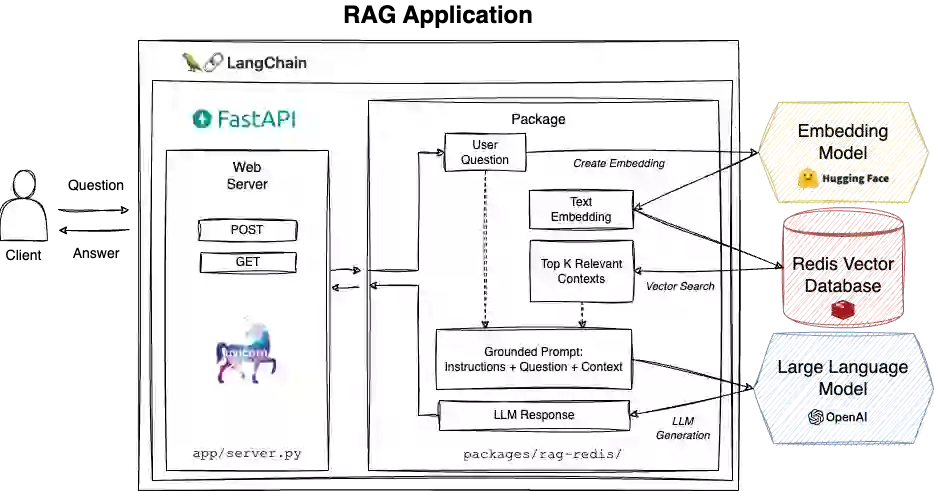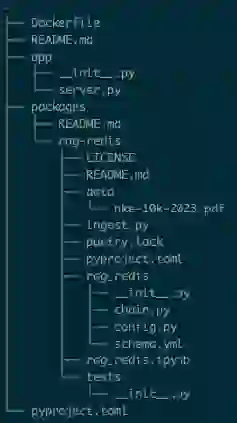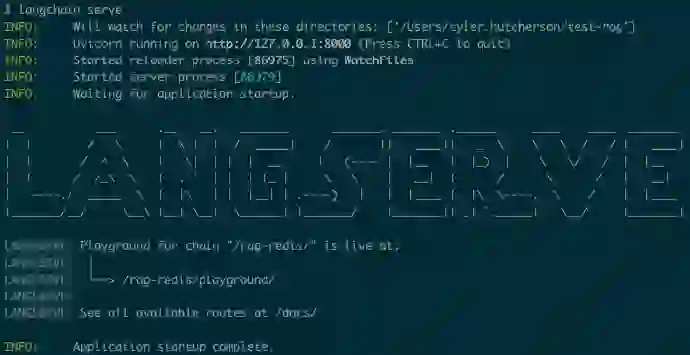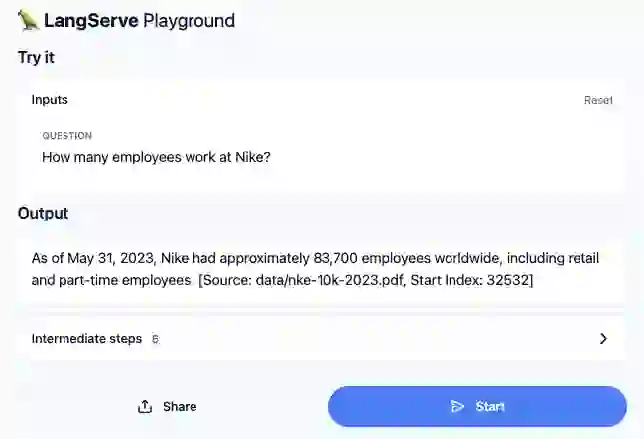
The recent launch of LangChain Templates introduces a transformative approach for developers to create and deploy generative AI APIs. LangChain Templates, including the new Redis Retrieval Augmented Generation (RAG) template, provide deployable reference architectures that blend efficiency with adaptability.
AI developers today face a deluge of technology choices between model providers, databases, and development frameworks such as LangChain. Additionally, getting to production requires significant investment beyond Jupyter notebooks and fancy Streamlit demos.
To reduce the friction in deploying APIs, LangChain offers a hub of deployable architectures. These templates encompass tool-specific chains, Large Language Model (LLM)-specific chains, and technique-specific chains, ensuring comprehensive developer options. Central to their deployment is LangServe, which uses FastAPI to transform LLM-based Chains or Agents into operational REST APIs, enhancing accessibility and production-readiness.
Redis partnered with LangChain to produce the Redis RAG template, a package optimized for creating factually consistent, LLM-powered chat applications. By using Redis as the vector database, this template ensures rapid context retrieval and grounded prompt construction, crucial for responsive and precise AI responses.
The Redis RAG template serves a REST API for developers to chat with public financial PDF documents such as Nike’s 10k filings. The application uses:

To run the RAG application with the template, you will need two things:
As always, refer to the official project README for the latest details. Here’s a step-by-step guide to build with the template locally:
1. Environment Setup: Set your OpenAI API key and Redis environment variables:
export OPENAI_API_KEY>
export REDIS_HOST>
export REDIS_PORT>
export REDIS_USER>
export REDIS_PASSWORD> Alternatively, you can set the REDIS_URL environment variable instead of the individual components.
2. Create and activate a Python3.9 virtual environment (best practice). We will use venv:
python3.9 -m venv lc-template
source lc-template/bin/activate
3. Install the LangChain CLI and Pydantic:
pip install -U langchain-cli pydantic==1.10.133. Create a new LangChain project:
langchain app new test-rag --package rag-redis>Running the LangChain CLI command shown above will create a new directory named test-rag.
When prompted to install the template, select the yes option, y. This step will download the rag-redis template contents under the ./test-rag/packages directory and attempt to install Python requirements.
4. Enter the new project directory:
cd test-rag
Looking at the directory tree, we should see the following structure:

5. To use the rag-redis package, add the following snippet to your app/server.py file:
from rag_redis.chain import chain as rag_redis_chain
add_routes(app, rag_redis_chain, path="/rag-redis")6. Ingest source data for demo app:
cd packages/rag-redis
python ingest.pyThis may take a few minutes. The ingest.py script executes a pipeline, as visualized below, that loads the source PDF docs, converts text into smaller chunks, creates text embeddings using a HuggingFace sentence transformer model, and loads data into Redis.

7. Serve the FastAPI app with LangServe:
cd ../ && cd ../
langchain serve8. Access the API on port 8000. After spinning up, you should see the following output:

Navigate to http://127.0.0.1:8000/docs to see documentation.
Visit http://127.0.0.1:8000/rag-redis/playground to use the testing playground, seen below:

Use the playground to test your API by asking a question. The LangChain application responds with an answer that combines rich context from the Nike company PDF, retrieved from Redis, with the generative abilities of the OpenAI LLM.
Our ongoing partnership with LangChain reflects a commitment to continual innovation in AI. This collaboration fosters the development of tools such as the LangChain RAG template and supports initiatives such as the OpenGPTs project. The partnership also fuels our work in maintaining the Redis <> LangChain integrations, as well Redis’ own AI-native client, redisvl.
Redis is dedicated to equipping AI developers with the latest resources for creating performant and production-ready applications.
The LangChain RAG template, powered by Redis’ vector database, simplifies the creation of AI applications. Build with this template and leverage these tools to create AI solutions that drive progress in the field.